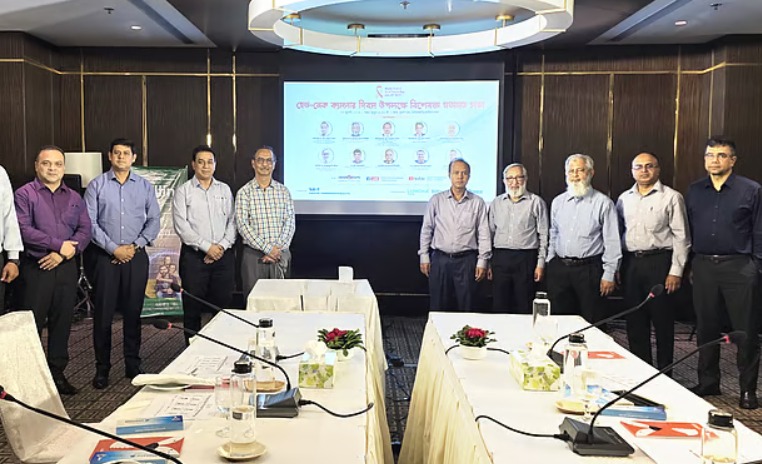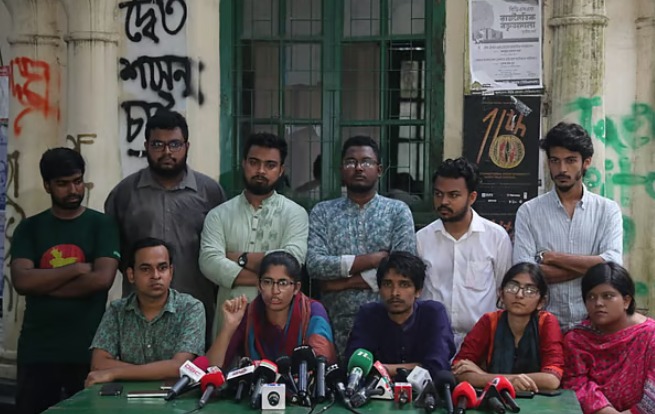Desk Report,
Head and neck cancer can be cured if treated at the right time.
Cancer is a serious disease. There are approximately 2 million cancer patients in our country, 200,000 people are affected every year and 100,000 people die. Accordingly, 273 people die due to cancer every day. And the risk of head and neck cancer is higher than other cancers. However, it is possible to recover from this cancer if you take the right treatment at the right time.
Head and neck cancer can be cured if treated at the right time.
Last Wednesday (July 30) was the ‘World Head and Neck Cancer Day’. Expert doctors shared this information at an online discussion organized by SKF Pharmaceuticals Limited on the occasion of the day. The media partner of the event was Prothom Alo.com and the brand partners were Lumna, Biltin, Kefuclav and Olnage.
President of the Bangladesh Head and Neck Surgeons Society and Head of the Department of Otolaryngology and Head and Neck Surgery of Bangladesh Medical University, Professor Md. The special discussion moderated by Abdus Sattar was attended by Professor Belayet Hossain Siddiqui, former president of the Bangladesh Head and Neck Surgeons Society and former head of the head and neck surgery department of Bangladesh Medical University, Professor Md. Mazharul Shaheen, head of the department of otolaryngology and head and neck surgery of Sir Salimullah Medical College, Professor Md. Hasan Zafar, director of the National Institute of ENT, and Professor Md. Jahangir Kabir, former head of the Department of Oncology and Radiotherapy of Square Hospitals Limited and cancer specialist Professor Kamruzzaman Chowdhury, General Secretary of the Bangladesh Head and Neck Surgeons Society and Associate Professor Anwar Hossain and Assistant Professor Syed Farhan Ali Rajib of the Department of Otolaryngology and Head and Neck Surgery of Bangladesh Medical University, and Executive General Manager (Medical Affairs) of SKF Pharmaceuticals Limited, Dr. Mohammad Mizanur Rahman and Assistant General Manager (Medical Affairs) of Dr. Muhammad Murad Hossain.
At the beginning of the program, Professor Belayet Hossain Siddiqui, former president of the Bangladesh Head and Neck Surgeons Society and former head of the Department of Head and Neck Surgery of Bangladesh Medical University, asked about head and neck cancer.
Professor Belayet Hossain Siddiqui said, “Head and neck cancer basically refers to many cancers in one group. Such as oral cavity cancer, respiratory tract cancer, nose or sinus cancer, skin cancer, ear cancer, etc. The reason for putting these cancers together is that their symptoms are almost the same. Even the process of identifying these cancers is also roughly the same. However, their treatment methods are different.’
When asked about the symptoms of head and neck cancer, Professor Hasan Jafar said, ‘Many times, blood comes out of the nose for no reason, there is no smell in the nose. Again, in the case of the throat, there is a recurring sore throat, a feeling of something being stuck in the throat, a gradual change in voice, etc. Apart from this, sores or bad breath may appear in the mouth or oral cavity. Along with this, if there is an ear problem, blood may come out of the ears.’
The host said that 3 out of every 5 patients ignore these initial symptoms. Then the presenter wanted to know, which habits can cause head and neck cancer?
In response, Syed Farhan Ali Rajib, Assistant Professor of the Department of Otolaryngology and Head and Neck Surgery, Bangladesh Medical University, said, “Those who are addicted to drinking, betel nut, tobacco or smoking are at high risk of head and neck cancer. In addition, head and neck cancer can be caused by various radiation and viruses.”
If a patient does not receive treatment for head and neck cancer at the right time, what kind of problems can occur? In response to the presenter’s question, Anwar Hossain, Associate Professor of the Department of Otolaryngology and Head and Neck Surgery, Bangladesh Medical University, said, “Head and neck cancer patients ignore the common symptoms. If the disease is detected in the early stages, it can be completely cured in many cases. However, if it reaches the very last stage, the patient has to go through a lot of physical suffering. So everyone should be aware of the symptoms.’
Professor Belayet Hossain Siddiqui, former president of the Bangladesh Head and Neck Surgeons Society and former head of the head and neck surgery department at Bangladesh Medical University, said, ‘There is no reason to be afraid if these symptoms appear all the time. Not all of them are cancer. However, if the symptoms persist for a long time, one must be aware. For example, if a sore on the face takes more than three weeks to heal, then identification is important. The same is true for the throat. If any problem occurs, wait for 3 to 4 weeks. Then you need to get tested to confirm whether it is cancer.’
Professor Kamruzzaman Chowdhury, former head of the oncology and radiotherapy department of Square Hospital Limited and cancer specialist, said, ‘The sooner head and neck cancer is identified, the faster it can be cured. In most cases, those who are diagnosed with these cancers at an early stage recover quickly with the help of surgery. If anything remains after this, they are given radiation therapy. In many cases, chemotherapy is given. When the cancer reaches an advanced stage.’ He further said, ‘When it reaches an advanced stage, many procedures have to be adopted. It also costs more. However, if it is detected early, it is beneficial in all aspects.’
Where can patients go for the best treatment for head and neck cancer? In response to the question, Professor Md. Mazharul Shaheen, Head of the Department of Otolaryngology and Head and Neck Surgery at Sir Salimullah Medical College, said, ‘If Amr




